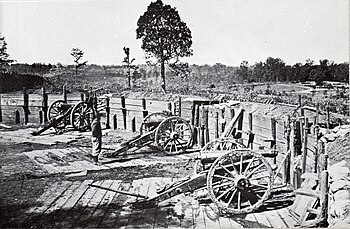 |
| Confederate artillery position |
After John Bell Hood's disastrous attacks on Sherman's lines around the town of Atlanta, Georgia, the campaign fell into a siege. The Federals positioned artillery and began to shell the town. The Confederate artillery defending the town replied, and the bombardment continued on and off for days. Sherman also sent his cavalry on raids to try to cut the rebel supply lines south of the city. The more skillful Confederate horsemen repulsed these raids, foiling Sherman's plans. He did not want to try to storm the Confederate works. They were strong, and he knew the difficulty of attacking a well fortified position from his reverses at Vicksburg and Kennesaw Mountain. Instead he moved against the railroad in the Confederate rear with a much larger force – six of his seven corps.
 |
| A house in Atlanta used by Confederate sharpshooters and hit by Union artillery |
Hood received intelligence of the Federal movement, and detached two corps under William Hardee to meet it, but he did not realize the true scale of the attack. On August 31st Hardee attacked Sherman's forces, but both corps did not engage in unison, and one of them was drive off easily by the Federals. The next day Sherman sent several of his corps against a salient in the Confederate line. The rebels fought hard, but the Federals pushed on, and after hand to hand combat broke through the Confederate line. Hardee's men fell back, and Jonesboro and the railroad fell firmly into Union hands. Back in Atlanta, John Bell Hood realized his supply line had been cut, and determined he had no hope of holding the town. The Confederates abandoned Atlanta that night, and the Federal troops occupied it the next day. As Sherman wrote triumphantly two days later, "Atlanta is ours, and fairly won."
 |
| Atlanta's railroad in ruins |
The fall of Atlanta signaled the end of the campaign. Sherman had captured his objective, though without completely eliminating the Confederate army. It came at a very providential time for the Union cause. Abraham Lincoln was in the midst of a reelection campaign. General George B. McClellan had just been nominated by the Democratic party to run against him. Lincoln was not hopeful about his chances for reelection. He had written just a few days before, on August 23rd, “This morning, as for some days past, it seems exceedingly probable that this Administration will not be re-elected.” The victory of Atlanta was a major turning point in the campaign. For months the fighting had continued to slog along, especially between Grant and Lee in Virginia, with heavy casualty bills but little to show for it. The fall of Atlanta was a major accomplishment, and it gave the northern people hope that the war was winnable, and before long the nation would be reunified.
 |
| Lincoln campaign poster |









0 comments:
Post a Comment